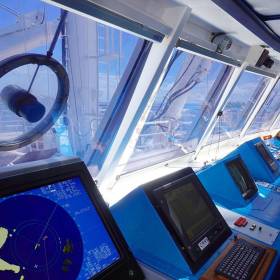Displaying items by tag: First Cruise Call
#CruiseLiners - A boutique yacht-like cruiseship just shy of 10,000 tonnes docked in Dun Laoghaire Harbour this morning as the first of just three callers this season, writes Jehan Ashmore.
The inaugural caller, Star Pride operated by US based Windstar Cruises with 208 guests had sailed from La Pallice, neighbouring La Rochelle on the French coast lining the Bay of Biscay.
On arrival to the south Dublin Bay harbour in the early hours, the former Seabourn Cruise Line vessel berthed at Carlisle Pier. This is where the considerably larger freight ro-ro Stena Carrier as previously reported had initially called first for survey work before again anchoring offshore. Surprisingly, the ship returned to port to enable crew rest until departing earlier this month.
Guests of the high-end luxury Star Pride are pampered in facilities among them lounges, a club, casino, screening room, computer room and library. As far as leisure facilities are concerned, there is a spa, two whirlpools, a swimming pool and a fitness centre. Accommodation comprises of 106 suites, all outside with ocean views.
Star Pride given its small size of 134m long, 19m (beam) wide and 5m draft, has the advantage of calling to destinations involving smaller harbours and secluded coves.
The next caller will be a fleetmate, Star Breeze also a sister which is scheduled but not until September with two calls. As both ships are small, there will be no anchorage callers in Dublin Bay to where considerably larger vessels did so of recent years, though last year the season attracted almost thrice the number of callers with 8 ships and all entering the harbour. Of those only one ship was not operated by Windstar, the expedition cruiseship Serenissima of Noble Caledonia, carrying a mere 85 passengers.
The third and final Windstar sister that visited Dun Laoghaire last year was Star Legend. The Seattle based operator also has a trio of sail-assisted ships, sisters Wind Star and Wind Spirit with four masts each. In addition the larger and impressive Wind Surf featuring five-masts that during calls to Dun Laoghaire has drawn much admiring attention in recent years.
The 310 guest capacity Wind Surf has became the most frequent to since the Dun Laoghaire Harbour Company made a concerted effort to attract the sector back in 2011, three years before the Stena HSS fastferry service to Holyhead closed.





























































